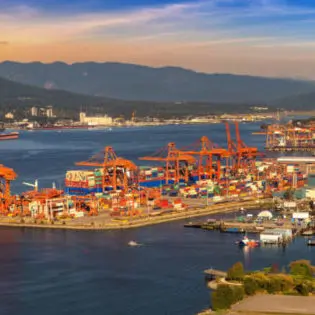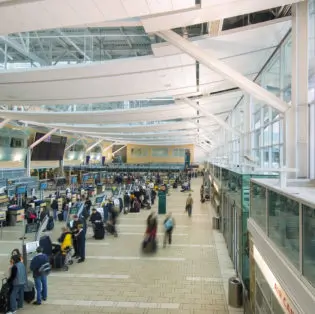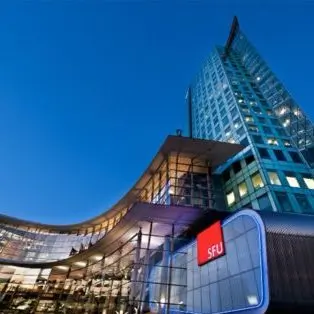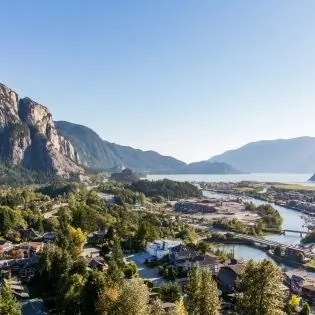Lower Mainland/ Southwest, British Columbia
The Lower Mainland is located on the southwestern side of British Columbia. It is one of Canada’s most ethnically diverse regions and has a well-earned reputation as a thriving, entrepreneurial business environment. Nicknamed Hollywood North, this region is a hub for film, television and visual effects. World-renowned gaming and digital media disrupters are inspired in this place where new ideas, products, and services are born. Vancouver is the transportation and shipping hub for Western Canada: an integral part of the global supply chain bringing products into and out of Canada. Key sectors in this region include Aerospace, Agriculture, Food & Beverage, Artificial Intelligence, Augmented Reality/Virtual Reality, Digital Media & Entertainment, ICT and Life Sciences.

Regional Advantages

CANADA’S LARGEST SHIPPING PORT
With 29 major marine terminals, three Class 1 railroads, and facilities to support international shipping, the Port of Vancouver is Canada’s most diversified port.

CANADA’S SECOND-BUSIEST AIRPORT
Ranked amongst the top three best airports in North America for 12-years in a row, YVR saw over 26 million passengers in 2019.

QUANTUM ALGORITHMS INSTITUTE
Located in Surrey, the institute works with universities and B.C. companies to focus on real world problems and support B.C.’s growing reputation in this field.

INSPIRING GREEN INNOVATION IN SEA TO SKY
The Sea to Sky Corridor, which includes Squamish, boasts world-class green innovation companies in carbon capture, resource efficiency, green building and renewables.
Key Sectors

Agrifood, Seafood
& Beverage

Aerospace

Clean Energy

Digital Media & Entertainment

Forestry

ICT

Life Sciences

Mining & Critical
Minerals

Marine

Mass Timber

Clean Tech

Agri Tech

Artificial Intelligence

Hydrogen
Communities
With 2.8 million people — nearly 61% of the province’s population — calling this region their home, the wealth of opportunities for work and learning are substantial. Richmond, New Westminster, Burnaby, Surrey, Delta, and White Rock are communities around Vancouver that contribute to the urban experience and economic value of the region, the province, and the country. The Lower Mainland is one of the most dynamic and diverse economies in North America with an abundance of opportunities and all the amenities expected of vibrant urban centres.
Discover more facts and statistics about this region:
Economic Development Organizations
First Nations
With Vancouver serving as Canada’s primary trade gateway to Asia, the region serves as a hub for many forms of economic activity. Financial services, health care as well as professional, scientific and technical services are key sectors. There is significant growth in the information technology, cultural, and recreational sectors. Transportation, education, secondary manufacturing, and agriculture continue to be core economic pillars.
Development corporations— owned collectively by aligned First Nations or by individual First Nations— are the primary vehicles by which First Nations pursue and advocate for sustainable economic development.
Economic Development Associations
Regional Profile
Educational Institutions

Simon Fraser University offers internationally recognized student co-op programs, cutting-edge researchers, and facilities in computing science, materials science, and clean energy.

BCIT offers diploma and certificate programs, and bachelor’s and master’s degrees covering subjects as diverse as applied and natural sciences, business and media, computing and IT, engineering, health sciences and trades.

Capilano University offers 97 programs, including bachelor’s degrees, post-baccalaureate and undergraduate diplomas, and certificates; as well as programs in business, paralegal, early childhood care and education, music therapy and design.

Emily Carr University (ECU) was rated as the top university in Canada for art and design and placed among the world’s top 50 universities for art and design.

Justice Institute of British Columbia (JIBC) is Canada’s leading public safety educator with a mission to develop dynamic justice and public safety professionals through its exceptional applied education, training and research.

Kwantlen Polytechnic University (KPU) offers a range of degree, diploma, certificate, and citation programs with hands-on experience and experiential learning opportunities.

The Vancouver campus of Nicola Valley Institute of Technology is a member of the Indigenous Adult and Higher Learning Association, created to work on behalf of Aboriginal-controlled post-secondary education institutes in British Columbia.

Vancouver Community College is the largest and oldest community college in British Columbia, offering certificate programs, diploma programs, and bachelor’s degree programs.

The University of the Fraser Valley offers over 100 programs, including master’s and bachelor’s degrees across more than 30 subject areas, including trades and technology programs.

The University of British Columbia (UBC) is a global centre for teaching, learning and research, consistently ranked among the top 20 public universities in the world.

Douglas College offers bachelor’s degrees, general university arts and science courses and career programs in health care, human services, business, and the creative arts.

Langara College provides university-level programs and courses and offers a variety of qualifications, including bachelor’s degrees, associate degrees, diplomas, certificates, and citations.
Connect With A Regional Expert
Regional experts can help familiarize you with the amenities, infrastructure, and opportunities in each region. They can introduce you to the economic development offices and industry associations that will support the integration of your business into the province.

